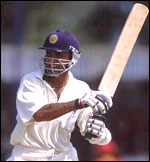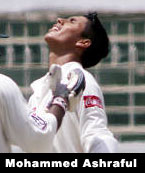The Bangla bashing
Daniel Laidlaw
Following the progress of Test cricket's newest member, it has become
patently obvious in recent matches Bangladesh are not up to Test standard.
Sri Lanka, one of Test cricket's better outfits, professionally did in
their Asian Test Championship match exactly what many other teams will in the
forthcoming months - totally annihilate the substandard newcomer.
We can talk of Australia playing on different level to England, or one
Test team not being at the same standard as another, but overall it is still a
competition between approximate equals, with the difference made in areas
that on any given day could be reversed.
Bangladesh vs Any Test Nation, however, is a genuine mismatch. Results
like the Asian Test Championship match against Sri Lanka are damaging to Test
cricket's credibility and, more significantly, are not beneficial to the
advancement of Bangladeshi cricket.
Now, it is very true that for any team or sportsperson to improve, it is
important to play opponents better than you. Most times you learn more
from defeat than you do from victory, but only up to a point. If a team is
losing
convincingly but still competing in the process, then it is still a
worthwhile exercise. But when that is not happening, and one team is being
humiliatingly routed, there is nothing to be gained by anyone.
At any sport at which you're proficient at a recreational level, you could
play a talented amateur, get thrashed, and still benefit from the
experience. But unless you're very good, playing someone of international
standard would be utterly pointless. The difference in standard is so vast
that neither party gains anything, and it becomes demoralising rather than
rewarding.
 That is what is happening to Bangladesh right now. They are so far out of
their depth that it is painful to see them up against international teams.
Imagine jumping from domestic one-day cricket to Test competition. The
divide is too great to be bridged and it must be harrowing. There needs to
be some middle ground - first-class cricket - to be at least partially
prepared for what they are facing in the big time. One-day internationals
are a poor substitute for first-class experience and the players are
missing
a vital intermediary step to prepare them for Test cricket.
That is what is happening to Bangladesh right now. They are so far out of
their depth that it is painful to see them up against international teams.
Imagine jumping from domestic one-day cricket to Test competition. The
divide is too great to be bridged and it must be harrowing. There needs to
be some middle ground - first-class cricket - to be at least partially
prepared for what they are facing in the big time. One-day internationals
are a poor substitute for first-class experience and the players are
missing
a vital intermediary step to prepare them for Test cricket.
Zimbabwe, despite the lack of resources, are ultimately gaining from their
lengthy struggles to compete. Perhaps Bangladesh will adjust quickly
enough
to make Test participation meaningful. The inaugural match with India was
encouraging. Against Asian powerhouses Pakistan and Sri Lanka, however,
their inadequacy has been exposed. The signs are distinctly inauspicious.
Debutante Pakistani leg-spinner Danish Kaneria took 12 wickets against
them.
The bowling attack has been flayed. And this on pitches that one assumes
would at least be similar to the ones the players are familiar with at
home.
It is ominous to think what might happen to them in foreign conditions
like
South Africa, whose team is presently mauling experienced battlers
Zimbabwe,
or Australia. Even away in Zimbabwe, the margins of victory to the former
African minnows - an innings and 32 runs and 8 wickets - were
comprehensive.
World records are set to be broken and their worthiness will be
questionable. Brian Lara's record 375 could be surpassed in two days of
solid strokeplay. Marvan Atapattu could have done it and if Sri Lanka
weren't playing such positive Test cricket these days, he might have.
 Sri Lanka put its love of records aside and opted to retire Atapattu and
Mahela Jayawardene, declaring at 555/5 in just 103.3 overs. Sri Lanka's
Daily News accused its team of ridiculing the game by retiring two
batsmen,
but it was the decision-makers who granted Bangladesh premature Test
status
who ridiculed the game, not Sri Lanka.
Sri Lanka put its love of records aside and opted to retire Atapattu and
Mahela Jayawardene, declaring at 555/5 in just 103.3 overs. Sri Lanka's
Daily News accused its team of ridiculing the game by retiring two
batsmen,
but it was the decision-makers who granted Bangladesh premature Test
status
who ridiculed the game, not Sri Lanka.
It is commonplace for batsmen to retire after having spent sufficient time
in the middle during first-class practice fixtures. In the context of the
Asian Test Championship, for Sri Lanka that's exactly what their match
against Bangladesh was. Michael Vandort was making his Test debut and
would
not have received an opportunity to bat under Test conditions, however far
removed from genuine competition, if Atapattu had not retired. Others
might
have thrown their wickets away with casual strokeplay in order to get
team-mates in, but why should a batsman be forced to do that?
Sri Lanka were well within their rights to treat the match as they
pleased.
The only surprise was that Atapattu, with a remarkable propensity for big
scores, was selfless enough to retire at 201 when he could have added to
his
personal statistics and possibly pursued Lara's world record.
 Even through Sri Lanka deserve credit for sportingly pursuing victory as
quickly and efficiently as possible, Bangladesh's Test status will allow
opponents to achieve inflated career records by padding their stats
against
the minnows, especially since the ICC schedule dictates they will play all
teams in regular two-match series. Wasim Akram must be kicking himself for
missing out on any wickets as he seeks to surpass Kapil Dev while Muttiah
Muralitharan, already with a sizeable piece of the action, and Shane Warne
must be salivating at the prospect of expediting their progress to 500
wickets.
Even through Sri Lanka deserve credit for sportingly pursuing victory as
quickly and efficiently as possible, Bangladesh's Test status will allow
opponents to achieve inflated career records by padding their stats
against
the minnows, especially since the ICC schedule dictates they will play all
teams in regular two-match series. Wasim Akram must be kicking himself for
missing out on any wickets as he seeks to surpass Kapil Dev while Muttiah
Muralitharan, already with a sizeable piece of the action, and Shane Warne
must be salivating at the prospect of expediting their progress to 500
wickets.
The question to consider is whether Bangladesh do actually have a talented
player base which is presently overwhelmed but will improve, or whether
they
are not equipped for first-class cricket. Having only played a few Tests
it's difficult to know for certain and it would be unfair to judge too
harshly so early in their Test existence. Too many more of these results,
though, and Bangladesh's presence in the Test arena will become a farce.
Having campaigned so earnestly for Test status, it is a pity more was not
done to assist the development of the players expected to be the
foundation
of the side. The Bangladesh establishment should either have sought this,
or
the cricket world that decided to embrace them with Test status should
have
come forward to assist.
Why couldn't Bangladesh have first participated in a first-class
competition
for a couple of years, possibly in Pakistan, to adjust to a higher
standard
of play? Perhaps even better, a number of players expected to play Test
cricket could have been sent, funded by the ICC's development money, to
several Test nations to play at club or first-class level in those
countries
to gain a feel both for the standard and the different playing conditions
around the world.
Neither of those preparations occurred, and instead Bangladesh were
awarded
hasty entry to the unforgiving elite level. At present, it appears they
got
a lot more than they bargained for, and it is not doing world or
Bangladeshi
cricket any good.
 Having said that, it's not all bleak. Mohammad Ashraful's record debut
century against the formidable Muralitharan suggests at least one
outstanding young talent and the average age of the Bangladeshi team is
only
24, hinting that there is scope for improvement. Judging by the numbers
there appears to be more batting talent than quality bowling, which is
understandable for an emerging nation unused to the rigours of the
first-class game.
Having said that, it's not all bleak. Mohammad Ashraful's record debut
century against the formidable Muralitharan suggests at least one
outstanding young talent and the average age of the Bangladeshi team is
only
24, hinting that there is scope for improvement. Judging by the numbers
there appears to be more batting talent than quality bowling, which is
understandable for an emerging nation unused to the rigours of the
first-class game.
Let us hope, for the sake of Bangladeshi cricket, that the second innings
batting performance against Sri Lanka, rather than the two Asian Test
Championship results, is the more accurate indication of the future.
More Columns
Mail Daniel Laidlaw